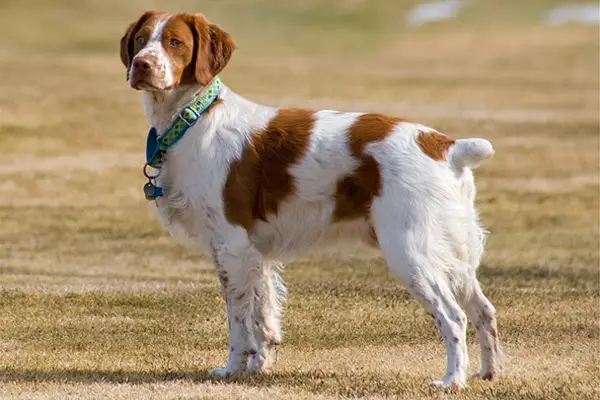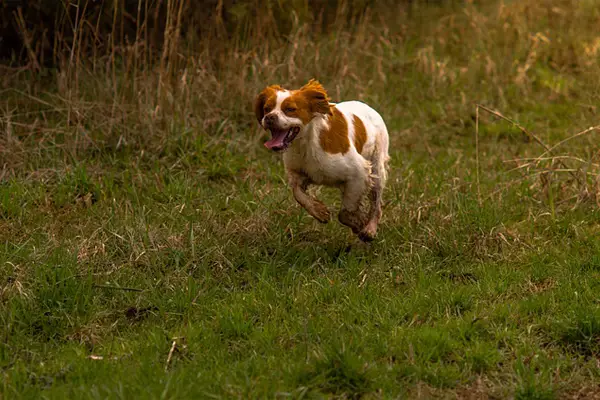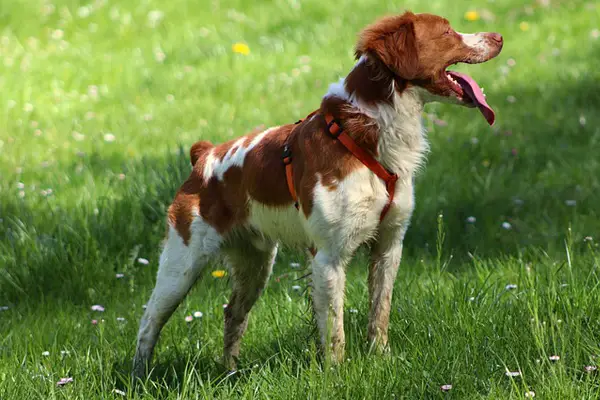Brittany Dogs are medium-sized gun dogs originally bred for bird hunting. These dogs feature a beautiful coat that comes in various color combinations. They also have docked tails, while few don’t have tails.
These are hyperactive dogs that are also perfect for families. They have a sweet and gentle temperament when it comes to children and other pets. However, this dog is not ideal for everyone. Brittany dogs have high exercise needs, and they need someone who can give them a lot of attention.
If you’re looking for an all-around hunting partner, Brittany dogs are just that. They love outdoor activities, and they love being with people, especially if it’s their humans.

Brittany Statistics
| Dog Breed Group | Sporting Group |
| Height | 17.5-20.5 inches |
| Weight | 30-40 pounds |
| Lifespan | 12-14 years |
Brittany Ratings
| Energy level | |
| Exercise needs | |
| Requires attention | |
| Playfulness | |
| Trainability | |
| Shedding | |
| Grooming | |
| Friendly with family | |
| Friendly with strangers | |
| Friendly with other dogs | |
| Prey Drive |
Brittany History
The origin of Brittany dogs is unclear. However, the earliest records of the Brittany dogs’ existence goes way back to the 17th century in paintings and tapestries.
It was only in the mid-1800s when Brittany dogs we know as of today started showing up in Brittany (the area they were named after). It was believed that Brittanys were formed through a crossbreeding of a white and mahogany female dog and a lemon and white male dog. Both dogs were made for hunting sports, and the breeding resulted in an all-rounder hunting dog.
The pups came out to have bob-tails and could hunt and retrieve. Local poachers immediately loved the breed, especially for their great speed, agility, and ease of training.
By 1907, the breed was finally recognized in France. Most even transitioned from being field dogs to being show dogs. And though they’re popularity grew in France, they didn’t reach the US lands until 1931.
By 1934, the first Brittany was registered under the American Kennel Club. They were originally called Brittany Spaniels. However, for years, breeders have debated on having the “spaniel” term removed as the Brittany dogs are pointing dogs. By 1982, the AKC finally dropped the word Spaniel from the name.
Now, there’s no stopping the worldwide popularity of the dog breed. It remains a pride that Brittanys are the world’s most versatile bird dogs.

Brittany Temperament
The American Kennel Club loves to describe Brittanys as bright, fun-loving, and upbeat dogs. In other words, they are highly energetic.
This breed is the perfect hunting partner. However, if you don’t hunt but love going on outdoor adventures, you can bring the Brittany dog with you. He thrives on an active lifestyle and would surely love to go hiking in woods, walking, running, or even playing fetch.
But, even with their hyperactive nature, Brittanys are also known to be soft dogs. They are highly sensitive and would be closer to you if you talk to him in a light and calm manner. They don’t do well in a loud and tension-filled environment. So, when training him, make sure not to do it harshly.
They love people, and their best place is beside their humans. They are known to be sweet to children, so you have nothing to worry about if you have kids.
However, because of their love for human companionship, they shouldn’t be left alone for long periods. They are prone to separation anxiety. And boredom can lead to excessive barking, chewing off things, and hyperactivity.
What’s even great with Brittanys is that they are polite and gentle, even with strangers. Plus, they remain peaceful even with other pets. However, to achieve this, Brittanys would need early socialization.
They are pretty easy to train, so this won’t be a problem at all. You can provide them with obedience training, and they comply easily.
Brittany Care Requirements
- Nutrition: Just like any other dog, Brittany needs a high-quality and well-balanced diet. They are a highly energetic breed, so it’s best to provide them a diet high in protein to fuel their energy. Plus, this also helps support their muscles. If you’re opting for commercial dry or wet food, make sure that the primary ingredient in animal protein. Avoid any meat by-products, plant-based proteins, and fillers as these have very low nutritional value. Avoid corn, barley, and wheat too. Also, if you have incorporated new ingredients, make sure to watch out for symptoms of allergies, and take note of them. It’s best to calculate calorie consumption to avoid overfeeding. Generally, an active Brittany should consume around 1000-1200 calories a day. This might differ if they get older and become less active.
- Grooming: The Brittany dog’s coat is either flat or wavy. However, no matter what coat he wears, it requires very minimal grooming. The fur doesn’t shed much, but you can give it a brushing at least twice a week. This will help minimize hair shedding problems when the shedding season starts. At the same time, regular brushing will keep your Brittany looking his best. Some owners prefer giving their Brittanys trimming around the head and neck area, too. This makes them look more clean and neat. If you’re opting for it, it’s best to have it done with an expert groomer. Bathing a Brittany dog should be done occasionally. Usually, this depends on the activities he’s participating in every day. However, cleaning the underside of the ears should be done regularly, even if you won’t bathe him. Don’t forget to check and trim his nails, too. Long nails will make it harder for your Brittany dog to run or walk, as this will give them pain.
- Exercise: Brittany dogs require a lot of exercise, which is why they are the perfect partners for hunters or outdoor adventurers. They also make an excellent dog-sport teammate (if you want to participate in one). At least an hour of high-intensity exercise is recommended every day. This could be in the form of long walks, running, biking, hiking, or playing fetch. If you have a fenced yard, then you can let him off the leash and have him run around to his heart’s content. They would enjoy joining in on canine events such as agility and speed.
- Health: The Brittany is known to be a very healthy dog breed, especially if given a sufficient amount of nutrients and exercise needs. However, they, too, can still be susceptible to some common health conditions. One common serious condition is hip dysplasia. This is a genetic condition where the ball and socket of the hip no longer fit properly. Symptoms are usually shown in the form of pain in walking, so you might need to keep a close eye on your Brittany. Other less serious health issues are hypothyroidism and epilepsy. Eye issues such as cataracts can be a problem as well.
- Lifespan: The life expectancy of the Brittany dog is 12-14 years.

Famous Brittany Dogs
- Edir du Mesnil: The first Brittany registered with the American Kennel Club
- Myrrha d’Armorique: First Brittany to win first place in a French field trial
- Boy and Martha: First Brittany dogs registered with the French Kennel Club
- Darla: Instagram famous Brittany with 547 followers
- Harley: Another Instagram famous Brittany with 972 followers
- Lucy: Instagram famous Brittany dog with 433 followers
- Tally: 2010 winner of Westminster’s Sporting Group
Fun Facts About Brittany Dogs
- Brittany dogs’ origin can be traced back to 17th century France.
- They were named after the place Brittany; a large peninsular area located Northwest of France.
- There are two types: the American Brittany and the French Brittany.
- They were bred for bird hunting.
- They were initially named Brittany Spaniels. The term “Spaniels” was removed in 1982.
- Brittany dogs’ heavy brows have a purpose. They protect them from prickly shrubs.
- Their coat comes in many colors: orange and white, liver and white, black and white, and tri-color.
The post Brittany appeared first on Furry Friends Gear.
Brittany posted first on https://furryfriendsgear.tumblr.com
No comments:
Post a Comment